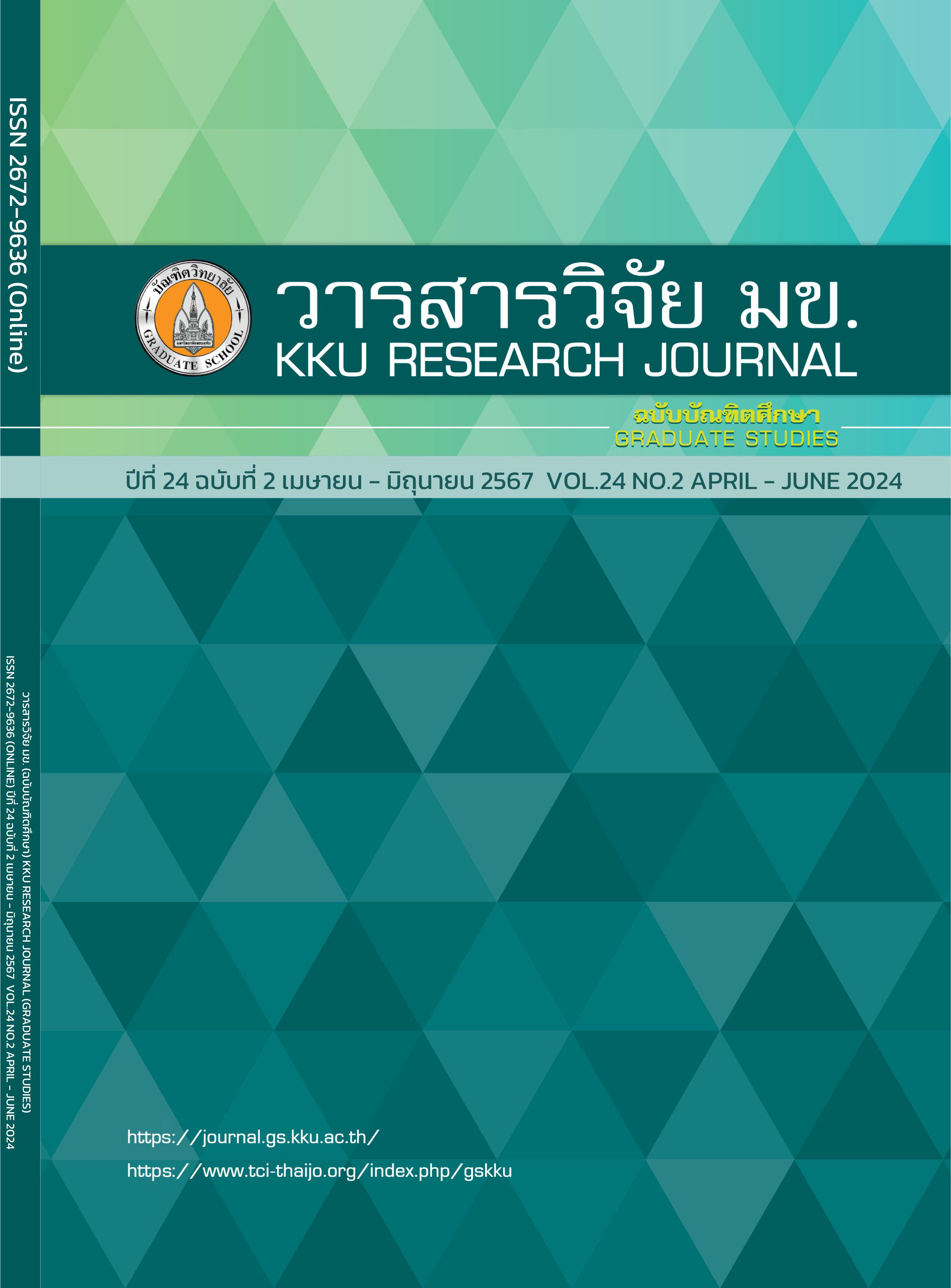The Study of Factors Affecting Housing Consumers' Behavior During COVID-19, Case study in Khon Kaen City
Keywords:
Demand of housing construction, Covid-19, Construction managementAbstract
During the COVID-19 outbreak, most individuals were more focused on their everyday lives indoors than outdoors. The behavior of people's housing demands has altered from the original to lessen the pandemic and the possibility to connect others. During the COVID-19 outbreak, most individuals were more focused on their everyday lives indoors than outdoors. The behavior of people's housing demands has altered from the original to lessen the pandemic and the possibility to connect others. There were 399 people in the computational research sample group. The level of the factor was analyzed by preliminary statistics and grouping elements with elemental analysis. The results of the research showed that the top three factors affecting the needs of consumers were the overall quality of the house. The location of the residence is convenient for living, and there will be demand for housing in the future. The average scores were 4.42, 4.35, and 4.31, respectively.
References
Levy, Sidney M. Project management in construction. McGraw-Hill Education, 2018.
Naewkhamdee N, Piakson P, Thapchula K, Leangruksa T. Factors Affecting Housing Buying Decision in Nakhon pathom District. Journal of Management Science Nakhon Pathom Rajabhat University. 2020; 7(1): 121-134.
Naewkhamdee, Narathip, et al. Factors Affecting Housing Buying Decision in Nakhon pathom District. Journal of Management Science Nakhon Pathom Rajabhat University. Journal of Management Science Nakhon Pathom Rajabhat University 7.1. 2020; 121-134.
Rice WL, Mateer TJ, Reigner N, Newman P, Lawhon B, Taff BD. Changes in recreational behaviors of outdoor enthusiasts during the COVID-19 pandemic: analysis across urban and rural communities. Journal of Urban Ecology. 2020; 6(1).
Takagi N, Varajão J. Success management and the project management body of knowledge (PMBOK): An integrated perspective. 2020.
Matias T, Dominsk FH, Marks DF. Human needs in COVID-19 isolation. Journal of health psychology. 2020; 25.7: 871-882.
Gamber W, Graham J, Yadav A. Housing demand during the COVID-19 pandemic. Journal of Housing Economics, 2023; 59: 101908.
Liu S, Su Y. The impact of the COVID-19 pandemic on the demand for density: Evidence from the US housing market. Economics letters, 2021; 207: 110010.
Mohammed SR, Naji HI, Ali RH. Impact of the feasibility study on the construction projects. In: IOP Conference Series: Materials Science and Engineering. IOP Publishing, 2019; p. 022074.
Loxton M, Truskett R, Scarf B, Sindone L, Baldry G, Zhao Y, Consumer behaviour during crises: Preliminary research on how coronavirus has manifested consumer panic buying, herd mentality, changing discretionary spending and the role of the media in influencing behaviour. Journal of risk and financial management. 2020; 13(8): 166.
Cruz-Cárdenas J, Zabelina E, Guadalupe-Lanas J, Palacio-Fierro A, and Ramos-Galarza C. COVID-19, consumer behavior, technology, and society: A literature review and bibliometric analysis. Technological forecasting and social change, 2021; 173: 121179.
Dahlhamer JM, Tierney KJ. Rebounding from disruptive events: business recovery following the Northridge earthquake. Sociological spectrum, 1998; 18.2: 121-141.
Lawrence Neuman W. Social research methods: qualitative and quantitative approaches. 2014.
Kholodilin KA. Housing policies worldwide during coronavirus crisis: Challenges and solutions. 2020.
Pranee. Finding quality of measurement and evaluation tools. Yala: Yala Rajabhat University. 2016.
Yamane T. Elementary sampling theory.1970; 310/Y919.
Gendall P. A framework for questionnaire design: Labaw revisited. Marketing bulletin-department of marketing massey university. 1998; 9: 28-39.
Drost EA. Validity and reliability in social science research. Education Research and perspectives. 2011; 38(1): 105-123.
Ostle B, et al. Statistics in research. Statistics in research., 1963, 2nd Ed.
Thorndike RL. Factor analysis of social and abstract intelligence. Journal of educational psychology. 1936; 27(3): 231.
Cohen, et al. Pearson correlation coefficient. Noise reduction in speech processing, 2009, 1-4.
Al Obaid HMA. Factors determining housing demand in Saudi Arabia. International Journal of Economics and Financial Issues, 2020, 10.5: 150.
Bick A, Blandin A, Mertens K. Work from home after the COVID-19 outbreak. 2020.
Tinson A, and Clair A. Better housing is crucial for our health and the COVID-19 recovery. The Health Foundation, 2020, 20.11: 1-25.
Poolthong Y, Mandhachitara R. Customer expectations of CSR, perceived service quality and brand effect in Thai retail banking. International Journal of Bank Marketing, 2009.
Kantawateera K, Naipinit A, Sakolnakorn TPN, Kroeksakul P. Tourist transportation problems and guidelines for developing the tourism industry in Khon Kaen, Thailand. Asian Social Science, 2015, 11.2: 89.
Downloads
Published
Issue
Section
License
Copyright (c) 2024 KKU Research Journal (Graduate Studies)

This work is licensed under a Creative Commons Attribution-NonCommercial-NoDerivatives 4.0 International License.


